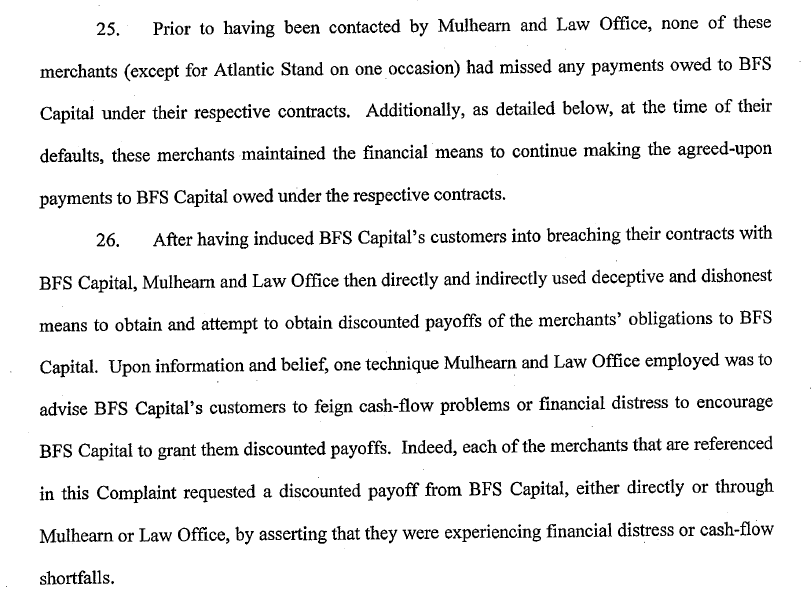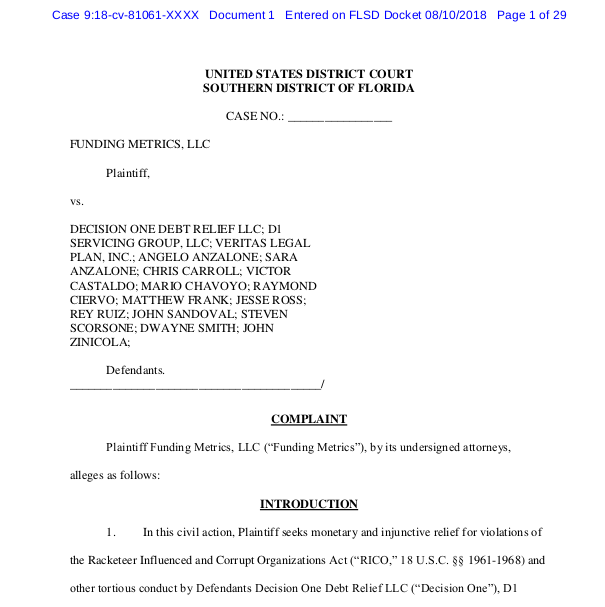Story Series: debt settlement
War on Debt Settlement Continues: 16 Defendants Sued in RICO Case
September 6, 2018
Fourteen individuals and two companies (including Decision One Debt Relief) were sued by Funding Metrics in Federal court last month for allegedly “conducting a nationwide illegal debt restructuring scheme through numerous acts of mail and wire fraud.”
The suit, which stems from the defendants’ interference with Funding Metrics’ merchant cash advance customers, makes six claims, among them financial damages resulting from state and federal crimes. Per the complaint:
“Defendant Decision One (along with its affiliate/alter ego D1 Servicing) fraudulently presents itself as being able to renegotiate and restructure merchant agreements with Plaintiff and other funding companies. It has established a deceptive business practice of making misleading and often outright false representations to merchants under contract with Plaintiff promising that, with its help, these merchants will save money on those contracts by defaulting on them. Decision One tells merchants that they can safely stop paying cash advance funding companies like Plaintiff; that it will go to work for them promptly; that it can reduce their debt by 60-80% or more; and that they will be provided with a Veritas insurance plan to cover legal expenses arising from their defaults, once cash advance companies exercise their rights under agreements with their merchants, as they inevitably will. Based on these misrepresentations, the merchants default on their contracts with their funders – that is, at Decision One’s direction, they stop paying their funders and instead pay Decision One – although Decision One does not even expect to achieve results for the merchants. The result is a fraud on the merchants and tortious interference with the contracts Plaintiff have with them.”
The suit is just the latest bomb dropped on the exploding debt settlement industry. deBanked began covering the controversy surrounding debt settlement in late 2016 after the owner and employees of an upstate New York debt settlement company were arrested for charging merchants to restructure their merchant cash advances and then not actually performing any services. The owner, Sergiy Bezrukov, was charged with money laundering, bank fraud, mail fraud, wire fraud and conspiracy to defraud. Bezrukov has been locked away in jail for almost two years awaiting trial. He is facing a maximum of 30 years. Two of his employees pled guilty, Vanessa Cardona to bank fraud and Dustin Walker to conspiracy to commit bank fraud.
Since then, nearly a dozen major lawsuits have been filed by merchant cash advance companies against other debt settlement companies that are alleged to be carrying out similar schemes. One of those sued companies, NJ-based Corporate Bailout LLC, was featured on the cover of the New York Post last summer for being “the craziest office in America.” Corporate Bailout was sued by both Yellowstone Capital and Everest Business Funding which later resulted in a very public settlement agreement that forced Corporate Bailout to fork over $500,000 to the two MCA companies.
Decision One Debt Relief, sued now by Funding Metrics, was also originally a co-defendant alongside MCA Helpline in a lawsuit filed by Everest Business Funding earlier this year. In February, after determining the two were not related, Everest dropped the claims against Decision One only. The suit against MCA Helpline is still pending.
Around that same time, a representative for Decision One revealed to deBanked that the company was on track to be doing more than $100 million a year in business.
Bezrukov, by contrast, who currently resides in a Niagara County New York jail, is accused of having only obtained $1.2 million throughout his entire debt settlement venture’s existence. Although Decision One is not being charged criminally, the private civil suit alleges damages caused by a violation of criminal statutes including RICO.
The Funding Metrics suit against Decision One was filed in the Southern District of Florida under ID# 9:18-cv-81061.
Details Emerge in Florida Lawsuit Against Corporate Debt Advisors
August 9, 2018 A debt settlement company being sued by Itria Ventures in Miami-Dade County, FL was asked to prove its claim that it has managed over $1.5 billion in total debt, court records show. That company, Corporate Debt Advisors (CDA), advertises that it provides debt relief for small business owners.
A debt settlement company being sued by Itria Ventures in Miami-Dade County, FL was asked to prove its claim that it has managed over $1.5 billion in total debt, court records show. That company, Corporate Debt Advisors (CDA), advertises that it provides debt relief for small business owners.
CDA responded to Itria’s request on June 29th with information relating to just two employees, Tony Shea and John Philbin, who combined through their previous experience have purportedly managed $1,584,000,000 of debt.
Not mentioned in their response is that each individual is prohibited from engaging in debt settlement services with Florida consumers where Corporate Debt Advisors is located.
According to the Office of the Attorney General, both Shea and Philbin previously and independently settled with the State after being investigated for running questionable debt settlement businesses. (See here and here)
In the lawsuit filed against CDA by Itria, it’s alleged that CDA is advising merchants to commit fraud by moving money owed to Itria to a new secret hidden bank account at a local bank in Florida where it will be out of reach from Itria.
This is not the first time Corporate Debt Advisors has been sued. In early July, a competitor to Itria, High Speed Capital, petitioned a New York court to turn over funds it believes CDA has in its possession for unlawful budget planning services rendered to a Florida-based business.
MCA Funder Says Debt Settlement Company Operating Illegally Without a Budget Planning License
July 11, 2018 Merchant Cash Advance companies are on the warpath against debt settlement companies. In the latest legal offensive, High Speed Capital alleges that Corporate Debt Advisors’ debt settlement business is really just an unlicensed Budget Planning operation, a misdemeanor criminal offense in New York.
Merchant Cash Advance companies are on the warpath against debt settlement companies. In the latest legal offensive, High Speed Capital alleges that Corporate Debt Advisors’ debt settlement business is really just an unlicensed Budget Planning operation, a misdemeanor criminal offense in New York.
High Speed’s petition cites New York General Business Law § 455. “So-called ‘debt negotiation’ and ‘debt settlement’ companies that negotiate settlements between debtors and creditors on behalf of the debtors and which may coordinate or supervise payment by the debtors to the creditors in exchange for fees from the debtor are engaged in Budget Planning,” they say. “Budget Planning agreements with unlicensed entities are void for illegality and cannot be upheld by the Court.”
At issue in this action is that the transfer of funds from the merchant to Corporate Debt Advisors is allegedly fraudulent. High Speed won a judgment against the merchant in October 2017 and believes those funds belong to it. Corporate Debt Advisors has refused to send the funds in its possession to High Speed and has instead tried to negotiate. High Speed’s petition before the Court asks that Corporate Debt Advisors turn over the funds immediately to High Speed.
The case can be found in the New York Supreme Court, Erie County under Index #: 810673/2018. You can view the petition here.
Collector Says “No” to Debt Settlement Companies That Want His Data
June 19, 2018
Debt settlement companies often find their leads by scouring through UCC filings, or publicly available forms that a creditor files to give notice that it may have rights to the property of a debtor. In the case of a small business, perhaps the refrigerators in a restaurant.
“[Looking through UCC filings] is a way of getting access to businesses that obviously owe somebody some money for their business,” said Shawn Smith, founder and CEO of Dedicated Commercial Recovery, a commercial collections company in Roseville, Minnesota.
But Smith told deBanked about another approach that debt settlement companies have taken to obtain leads of struggling businesses. He said they come to him.
“Who has a ton of accounts of struggling business owners?” Smith said. “Debt collection agencies that are working on behalf of funding sources. So [we] have like a list of all lists.”
Smith said that he gets approached by debt settlement companies looking for the contact information of struggling companies.
He always says “no.”
“They’re coming to me and saying ‘Hey, you know, for any merchant you send us that’s struggling, if we start working with them to help settle their debts, we will give you a large portion of the fee we make on settling that debt,’” Smith said. “And we of course would never do that.”
Dedicated works in two areas of collections: merchant cash advance and equipment leasing. In both cases, its goal is to recoup money for its clients, either merchant cash advance companies or equipment leasing companies.
Unlike this arrangement, a debt settlement company is not hired by a funding company. Instead, according to Smith, the debt settlement company searches for a struggling company, instructs the merchant to stop paying the funder and then approaches the funder with a settlement deal for often a fraction of what the funder is entitled to under the agreed upon deal. Smith said that settlement companies almost always propose to the funder: 20 percent of the value of the deal over five years.
Smith said he does work with debt settlement companies if they approach him representing a small business that can’t pay its bills, as long as what’s offered is within the range of what the funding company client would accept. Otherwise it’s a no-go. While Smith doesn’t share the names of struggling small businesses in exchange for kickbacks in the event of repayment, he’s convinced that this happens as he continues to be approached.
Founded by Smith in 2015, Dedicated has a staff of 18.
Settling Up: Debt Settlement Companies Paid Yellowstone Capital and Everest Business Funding a Half Million Dollars to End Lawsuit
June 12, 2018 A group of debt settlement companies and ISOs have entered into a settlement they’re unlikely to forget. A lawsuit that accused Corporate Bailout, Protection Legal Group, Mark Mancino, Michael Hamill and others of tortious interference with merchant cash advance contracts has led to a settlement in which the defendants agreed to pay Yellowstone Capital and Everest Business Funding $500,000. They also agreed not to offer any services to Yellowstone or Everest merchants in the future, deBanked has learned.
A group of debt settlement companies and ISOs have entered into a settlement they’re unlikely to forget. A lawsuit that accused Corporate Bailout, Protection Legal Group, Mark Mancino, Michael Hamill and others of tortious interference with merchant cash advance contracts has led to a settlement in which the defendants agreed to pay Yellowstone Capital and Everest Business Funding $500,000. They also agreed not to offer any services to Yellowstone or Everest merchants in the future, deBanked has learned.
The original complaint alleged that ISOs had partnered with companies that purport to offer debt relief services to merchants with MCAs. In practice, the complaint said, debt relief was a code word for deceiving merchants to breach their existing agreements so that they could pay fees instead to the debt relief companies.
When asked to comment, Yellowstone Capital CEO Isaac Stern said that there were companies that offer this kind of service the right way but that was not the case here. “The way they’re going about it is really wrong,” he said.
Of note is that the bound parties were not just debt settlement companies but also ISOs and a law firm (Mark D. Guidubaldi & Associates, LLC dba Protection Legal Group).
Additional companies not named in the original complaint but nonetheless bound to the settlement are Mainstream Marketing Group and Corporate Client Services LLC. Websites for both companies say that they offer small business debt relief services.
Coast to Coast Funding LLC, who the defendants represented they had no control of, did not participate in the deal.
The settled matter is not the first of its kind. Everest and Yellowstone have been hammering debt settlement companies with lawsuits this year, according to court records examined by deBanked. In January, Everest sued MCA Helpline and Todd Fisch for tortious interference, and just last month Yellowstone filed a Petition to recover funds that were allegedly fraudulently transferred by Settle My Cash Advance.
In the latter case with Settle My Cash Advance, the defendants are alleged to have actively coached a merchant to hide his money in new bank accounts and hide the paper trail rather than pay the money owed to Yellowstone.
Speaking about no case in particular, Stern said “Imagine getting a commission on a deal [where you help a small business get funding] and then sending it to a debt settlement company. If there are ISOs that are doing that, we’re going to come after you hard.”
Sneaky Debt Settlement Company Temporarily Restrained by Judge
May 20, 2018 A debt settlement company has sunk to new lows, according to a petition filed by Yellowstone Capital in Nassau County. Defendants SMCA, Inc. DBA Settle My Cash Advance, Thassos.com Corp DBA Thassos.com, and George Alexander, have been accused of fraudulently transferring funds owed to Yellowstone Capital to themselves while trying to mask the evidence in the process.
A debt settlement company has sunk to new lows, according to a petition filed by Yellowstone Capital in Nassau County. Defendants SMCA, Inc. DBA Settle My Cash Advance, Thassos.com Corp DBA Thassos.com, and George Alexander, have been accused of fraudulently transferring funds owed to Yellowstone Capital to themselves while trying to mask the evidence in the process.
Unlike other purported debt settlement schemes, the Settle My Cash Advance defendants are alleged to have first actively coached a merchant to hide his money in new bank accounts rather than pay his judgment. This, according to emails attached as exhibits, included instructions by the defendants on how to cover up the paper trail so that the money could not be traced. Once this was successfully carried out, the defendants then absconded with the merchant’s money, leaving him broke and the judgment still unpaid.
According to the merchant’s sworn affidavit, Settle My Cash Advance lured him into believing that they not only had a relationship with Yellowstone but that they would also reduce the judgment entered against his business by 25% – 70%.
“SMCA (Settle My Cash Advance) told me to transfer all funds, as my business and I earned them, to SMCA to hold them for us so that Yellowstone could not collect on its judgment,” the merchant wrote. “The deal that SMCA represented to me was that SMCA would take the funds, hold them in trust, and use them to settle our obligations with Yellowstone for a small contingency fee.”
What happened instead is that the defendants ran off with the money held in trust and did nothing to help with Yellowstone, the documents say.
Presented with the facts laid out before it, the Court ordered that the funds held by Settle My Cash Advance be restrained pending a May 30th hearing.
Decision One Debt Relief, MCA Helpline Not Related, Company Says
February 7, 2018Everest Business Funding has voluntarily withdrawn claims against one of three named defendants in a debt settlement tort lawsuit in Florida, court records show. The case against Decision One Debt Relief was withdrawn without prejudice on February 2nd.
That leaves MCA Helpline, LLC and Todd Fisch individually as the remaining named defendants.
Everest had originally alleged that Fisch was the individual behind both MCA Helpline and Decision One Debt Relief. Decision One Debt Relief, however, told deBanked that the two companies had no ties to each other. “Decision One has no relation with Todd Fisch or MCA Helpline,” Decision One’s president wrote as part of an emailed statement about the dismissal.
Everest is still seeking damages for the remaining Defendants’ tortious interference with at least a dozen of its merchant contracts.
Law Firm Sued for Tortious Interference With Loans and MCAs
January 31, 2018Rhode Island Superior Court has a tortious interference case on its hands. Small Business Term Loans, Inc., and BFS West, Inc. v Christopher M. Mulhearn, and Law Office of Christopher M. Mulhearn, Inc. is yet another front in the debt settlement war enveloping the alternative finance industry.
Here, the plaintiffs (known to many as BFS Capital), allege that Mulhearn and his law office attempt to persuade BFS Capital’s customers to breach their obligations to BFS Capital while routinely making misleading representations to their customers, including by promising to save them money by settling their obligations to BFS Capital for a discounted amount when they have no legitimate basis for being able to make such promises.
At least seven customers are alleged to have breached their agreements as a result of the defendants’ actions.

The defendants have not yet responded to the complaint. The suit is registered in Providence/Bristol County Superior Court of Rhode Island under case # PC-2018-0094.
Other such companies that have found themselves on the receiving end of a tortious interference lawsuit include MCA Helpline, Protection Legal Group, and Creditors Relief.






























